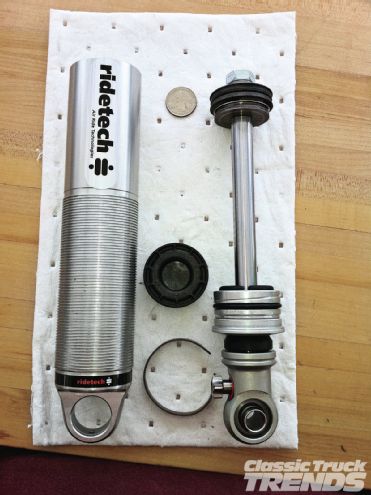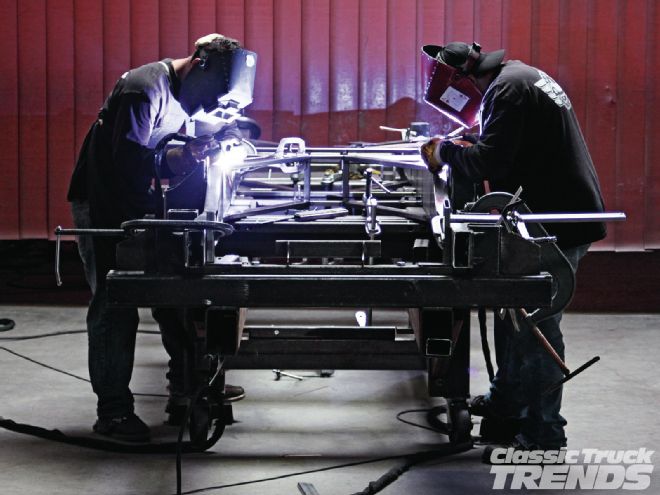
Look around and see that companies like RideTech, Scott's Hotrods, Currie Enterprises, Wilwood, Fatman Fabrications, TCI Engineering, Hotchkis, and CPP have been making suspension parts that not only step up the performance, but also make your truck look really cool. Lowering suspension parts, quality shocks, sticky tires, and disc brakes are all available throughout the ever-growing classic truck market.
Let's look at what it takes to not only lower that cool old truck, but to make the darn thing ride great and handle a whole lot different. Back in the early days, we used to lower trucks by placing donor frontends from cars like Camaros, Novas, Chevelles, or Volares. There was nothing wrong with that way of thinking because, at the time, there was no minimal and no options when it came to buying a custom frontend. It was as simple as cutting the frontend off the donor vehicle and grafting it onto your pickup.
The only hiccup was you were stuck with whatever springs, shocks, and brakes came on the frontend. Just because the frontend works on your buddy's pickup doesn't mean that it would be the ideal setup for your truck. I've seen some really nice frontends installed using donor clips, but I have also seen the really horrible ones that make you cringe.
Nowadays donor clips are not the only answer. In fact Fatman, Scott's, and TCI Engineering all make a weld-on frontend that fit just about every truck application on the road. Not only do they make weld-on frontends, but also in some cases front clips are available for someone who doesn't want to spend the time boxing the frame or making engine mounts. If you have or are looking into buying a '63-72 Chevy truck, then bolting parts on is a lot simpler than the earlier Chevys or Fords. In '63 Chevy started making trucks that came standard with independent front suspension (IFS) and that gave truck enthusiasts easier options when it came to performance upgrades. Bolt-on tubular control arms sure make the '63-72 Chevy trucks stand out because of how easy they are to modify.
Fatman Fabrications
When it comes to front IFS kits there are tons of products out on the market. In this photo we see Fatman Fabrication IFS installed on a ’59 Chevy Fleetside. This style IFS has a coilover that supports the frontend rather than a Mustang II that has a coil spring pocket with a shock. The IFS has a slight advantage in that you get more travel from a longer coilover. The downside is the IFS w/coilover will end up costing a little more because of the coilovers. Note: As an upgrade I added a RideTech coilover with a Wilwood big brake kit.
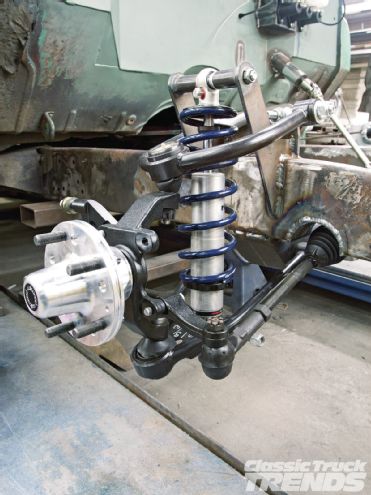
In this photo we see a Fatman Fabrication Mustang II-style frontend. If I were on a budget then a Mustang II-style frontend will give a great-riding vehicle at a reduced cost. The Mustang II style can also be upgraded to better shocks such RideTech’s single adjustable monotube that give better control and help keep the vehicle planted on the ground.
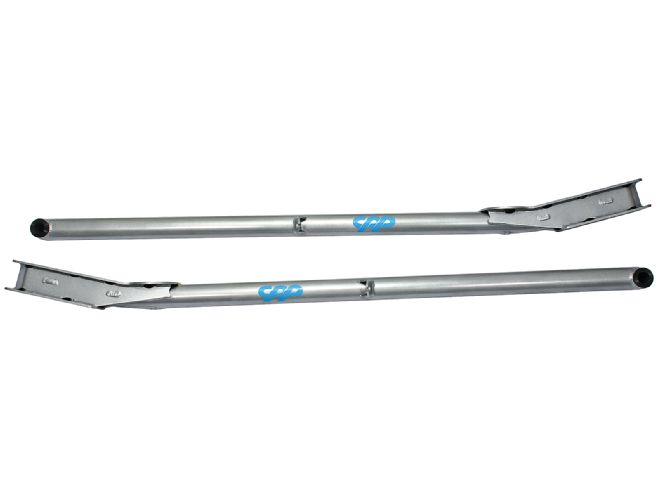
For you lucky guys with ’63-72 and ’73-87 C10s, CPP has a set of upper and lower control arms that replace the chincy-looking stamped arms. The upper control arms are made from 1¼x.120-inch wall and the lower is 1½x.120-inch wall D.O.M. tubing. The bushings are made from self-lubricating non-squeak patented plastic that will outlast any rubber or urethane. The control arm assemblies are a simple bolt-in installation with no modification required.
Take those old rusty trailing arms out of the mix and replace them with CPP’s Totally Tubular trailing arms for ’63-87 Chevy trucks. They are stronger than the stock arms and can be used with spacers to help determine ride height.

Scott’s Hotrods has a really cool bolt-in IFS that replaces the stock C10 crossmember and is 100-percent bolt-on. The stock C10 crossmember will limit how much you can lower the truck. By bolting on Scotts’ crossmember you gain extra ground clearance for speed bumps and can effectively lower the truck more.
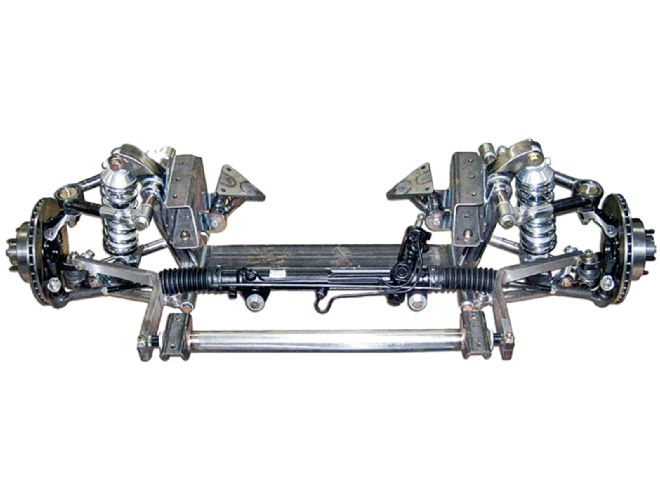
Parallel four-bar is available to fit multiple truck applications across the board. Shown in yellow is a TCI Engineering Parallel four-bar that allows the truck adjustability for ride height via coilovers. The four-bar also can increase traction when accelerating and has great cornering characteristics. A Panhard bar is used to locate the rear axle, and in some cases is adjustable to help with tuning the roll center of the truck.
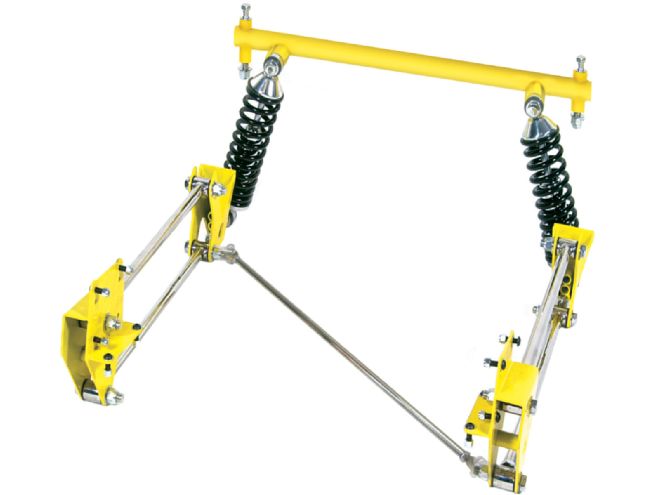
While monotube shock technology is the newest and most effective these days, it is hardly unproven. RideTech has worked closely with Fox Racing Shocks to bring this technology to the hot rod market. Fox has a 35-year history of success in the bicycle, motorcycle, off-road, and military markets with this design and it has proven to be both extremely effective and reliable. Another significant difference between the monotube and the twin tube is the fluid path. By offering a simpler and more efficient fluid path, the monotube creates less heat and offers more stable performance characteristics. RideTech’s monotube is now standard with all their suspensions...coilover, ShockWave, and smooth body shock kits. Also shown are the various spring rates and lengths that RideTech offers using Hyperco coils.
Front and rear suspensions need to be controlled by shocks and coils or coilovers. In this top picture we show the inside of a RideTech monotube single adjustable coilover. One of the more dramatic differences between a typical twin tube shock (which is the oldest and most common design in the hot rod market) and the new RideTech monotube shock is the diameter of the piston. Notice the quarter placed beside each piston to put them in perspective. The RideTech monotube shock offers approximately 150-percent more effective area to control the oil (and therefore shock dampening forces). Imagine how much easier it is to make 500 hp with a 454 piston versus a 307 piston!
